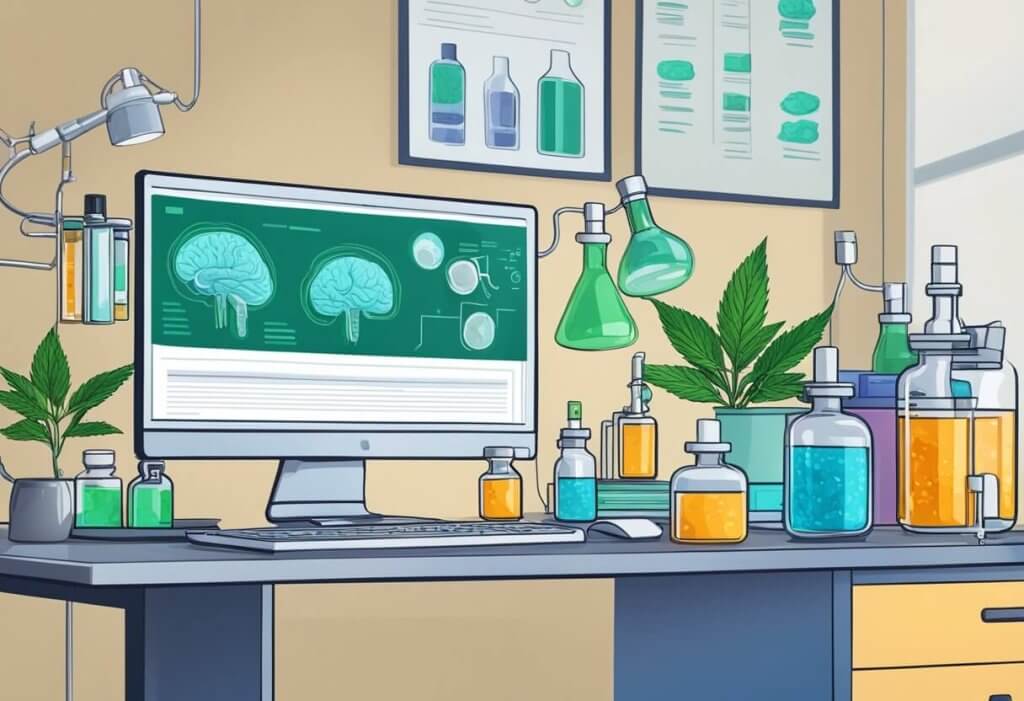Can It Really Help Break the Cycle?
Disclaimer: The anecdotal benefits of CBD mentioned on this website are based on preliminary research and individual user experiences. All information presented here is not meant to substitute for or replace information from health care practitioners. Please click here for our full disclaimer, including side effects, FTC position, etc.
Addiction is a cruel and relentless taskmaster, affecting millions of lives worldwide. Despite the availability of various treatments, many find themselves trapped in a vicious cycle, desperately seeking a way out. Enter CBD, a natural compound that has emerged as a beacon of hope for those battling addiction.

Research into CBD’s potential for treating addiction has gained significant momentum in recent years, fueled by a growing understanding of its neuropsychiatric benefits.
CBD, or cannabidiol, is a non-intoxicating compound found in the cannabis plant that has been shown to interact with the body’s endocannabinoid system, which plays a crucial role in regulating mood, stress, and addiction-related behaviors.
By modulating this system, CBD may help reduce cravings, alleviate withdrawal symptoms, and promote emotional balance, offering a glimmer of hope to those striving to break free from the grip of addiction.
Key Takeaways
- CBD is being studied for its potential roles in addiction treatment, focusing on its non-psychoactive effects and interaction with the endocannabinoid system.
- Emerging research suggests CBD may help alleviate withdrawal symptoms and reduce cravings in various forms of addiction.
- Due to the complex nature of addiction, CBD is considered as a possible complementary therapy within broader addiction recovery programs.
Understanding Addiction and CBD

In exploring the relationship between CBD and addiction, one must consider the complex science of addiction itself and CBD’s interplay with the brain’s endocannabinoid system, particularly compared to its psychoactive counterpart, THC.
The Science of Addiction
Researchers define addiction as a chronic, relapsing disorder characterized by compulsive drug seeking, continued use despite harmful consequences, and long-lasting changes in the brain. It is considered both a complex brain disorder and a mental illness.
Addiction is fundamentally associated with the brain’s reward circuits and involves a neurotransmitter called dopamine, which plays a crucial role in reinforcement and motivation for behaviors.
CBD and the Endocannabinoid System
The body’s endocannabinoid system (ECS) is a network of cannabinoids and receptors that regulate various physiological processes, including pain, mood, appetite, and memory.
Cannabinoids like CBD interact with this system, specifically at the CB1 and CB2 receptors. CBD’s influence on these receptors, particularly CB1 receptors in the brain, may affect the neural pathways involved in addiction, potentially lessening cravings and symptoms of withdrawal.
“[CBD] is a compound that we’ve seen reduce cravings and reduce anxiety in people with heroin addiction. It’s also something that seems to be safe and well-tolerated. The intense craving is what drives the drug use. If we can have the medications that can dampen that, that can greatly reduce the chance of relapse and overdose risk.”
Dr. Yasmin Hurd, director of the Addiction Institute at the Icahn School of Medicine at Mount Sinai in New York City.
CBD vs. THC: Differences in Addiction Treatment
While both CBD and THC (tetrahydrocannabinol) are components of the cannabis plant, their effects on addiction and the brain are distinct.
THC is the primary psychoactive component in marijuana that can cause dependence and addiction. In contrast, CBD does not have these psychoactive effects and is considered non-addictive.
Some evidence suggests CBD may even help treat addiction by modulating the reward system, although legal considerations in the United States affect research and use of cannabis-derived substances, including CBD from hemp.
Evidence and Application of CBD in Addiction Recovery

Cannabidiol, or CBD, has garnered attention as a potential tool in addiction recovery due to its suggested therapeutic properties. Studies are examining its effects on various substance use disorders and its role in managing addiction-related symptoms.
Clinical Research on CBD for Substance Use Disorders
Recent studies have scrutinized CBD’s influence on addiction. In particular, a systematic review highlights its modulation of neuronal circuits linked to drug dependency.
Clinical trials suggest CBD could have a place in treating opioid addiction, as well as dependency on substances like cocaine, methamphetamine, and cannabis.
Using CBD to Manage Withdrawal and Relapse
CBD might ease withdrawal symptoms such as pain, anxiety, and nausea, which often contribute to relapse.
Research, like that captured in this therapeutic review, indicates CBD’s potential to reduce conditioned place preference, a measure of relapse risk. However, controlled trials are still needed to establish its benefits more definitively.
Practical Considerations for CBD Use
When thinking of incorporating CBD into treatment, a few factors remain critical:
Dosage and Administration: It’s essential to take a measured approach, as the FDA has approved CBD as Epidiolex for certain conditions, but the optimal doses for addiction recovery are still under investigation.
Quality and Safety: Users should ensure CBD products are from reputable sources to ensure quality. They should also know potential side effects like drowsiness, nausea, and diarrhea.
Legal Standing: While Epidiolex is FDA-approved in the United States, CBD’s legal status can vary by state. Always check state regulations regarding CBD use.
Promising Study: A 2019 study published in the American Journal of Psychiatry found that CBD may help reduce cravings and anxiety in people with heroin use disorder. The study found that those who received CBD experienced significantly reduced cravings and anxiety compared to the placebo group, with the effects most pronounced in the group receiving the higher dose of CBD.
https://ajp.psychiatryonline.org/doi/10.1176/appi.ajp.2019.18101191
Frequently Asked Questions
Exploring the potential of CBD in the addiction treatment landscape, the following questions address common inquiries on its efficacy and safety.
Is there any evidence that CBD can reduce addiction symptoms?
Research indicates that CBD might have a role in reducing addiction symptoms. Some evidence suggests CBD can be beneficial in treating addiction, though its effectiveness can vary based on the type of addiction and individual circumstances.
How does CBD influence withdrawal experiences?
CBD is thought to ease withdrawal symptoms by interacting with the body’s endocannabinoid system, potentially alleviating anxiety and discomfort during the withdrawal process.
Can using CBD contribute to managing substance cravings?
There’s a growing body of literature suggesting that CBD may help manage cravings for various substances. By modulating neurotransmitter systems, CBD could play a part in reducing the urge to use substances.
What’s the role of CBD in supporting mental well-being during recovery?
CBD’s potential to support mental well-being in recovery stems from its anxiolytic properties, which may promote relaxation and reduce stress often associated with recovery from addiction.
Are there specific addictions where CBD is known to be more effective?
While research is ongoing, some studies suggest CBD might be more effective for certain types of addictions, like those involving nicotine or psychoactive substances, though definitive conclusions await further research.
How safe is it to use CBD as a supplementary treatment for addiction?
Generally, CBD is considered safe for use. However, using CBD as a supplementary treatment should always be approached with caution. Users need to ensure product quality and monitor for any THC content. THC might affect safety. Consulting healthcare providers before starting CBD use for addiction treatment is always recommended.
“Explore Harmony Ridge Recovery Center’s insights on using CBD in addiction recovery and understand the potential benefits.” – source: The Benefits of Using CBD in Addiction Recovery
https://www.harmonyridgerecovery.com/cbd-in-addiction-recovery/
